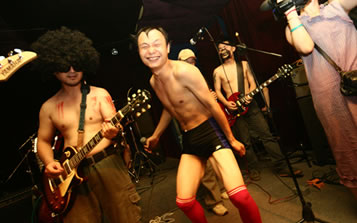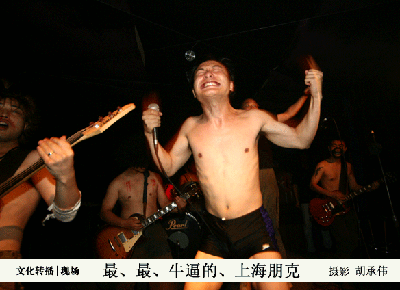Three Grievences Against The Way Chinese Parents Educate Their Kids
By: Unknown
Date: May 11, 2006

("You're a well-behaved child.")
In general, parents face four challenges in educating their children at home: to cultivate a healthy child-parent relationship, to raise a socially and mentally bright child, to engender their child's self-confidence, and to raise a child who can overcome challenges. In fact, these are four areas where I've seen parents fail in raising their children, leading to problems which I'll call "the three grievences."
Grievence 1: Why the need to raise a "guai" child?
There is currently a big misunderstanding in our country--that children need to be "guai". In appraising a child, it's easy to say "you're really guai!" or "you're not being guai," where guai serves as an educational guidepost, concretly meaning "obedient", indicating a child who follows teachers' or parents' instructions. But what's worth noting is that there is no corresponding word for guai in English!
In molding these batches of "goody two-shoes" kids, we often deprive kids of a space to build their self-esteem. It even gets to the point of strangling their creative ability! This turns out to be an extremely lopsided approach to the socialization process.
When handing out awards for good behavior in school, why are 7 or 8 out of every 10 given to girls? Why don't we ever see those over-active boys in the ranks of "students of the month"? It's quite simple, really; compared to boys, girls are easier to quiet down and put to work: they don't rabble-rouse, don't question the teacher. They completely conform to what society recognizes as the guai child standard.
The model students who get awards for good behavior, admittedly, are worth recognizing. But in my opinion there's also something to learn from the other kind, those naughty and disobedient kids. For example, the ones who like to fidget in class: even though they're often reprimanded by the teacher in class, each time they are disciplined they immediately dust themselves off and continue being naughty. So what I'm saying is, their ability to take hits and keep on ticking will be much stronger than that of the model students. Being able to adjust their own attitude to weather a hardship becomes a valuable ability! In the future, they will be able to face life with an unshakable optimism, an ability which will serve them well when they step into the real world.
Expert view: Disobedience is not necessarily bad behavior.
In actuality, occasional disobedience of parents by young children is a special characteristic of their mental and physical development. Some psychologists think that a 3 year-old infant who doesn't protest his parents is not developing normally. By five to six years-old, disobedient behavior should be evident. In any case, as today's child grows up in an information rich environment he absorbs information right and left, and should develop his own way of thinking about things. If parents begin to apply adult standards to their children at an overly early age they risk running afoul of the child's natural development rhythm, squelching his childhood and destroying his invaluable and unique creative self. For the parents this would be a regrettable and irreprable mistake.
A noted German developmental psychologist performed a related experiment. He did a study covering the early years of one hundred 2-5 year-old children who strongly resisted authority, compared to 100 children who didn't display this trait. The results showed that 84% of the first group of kids grew up to have a strong sense of determination, their own point of view about things, independent analytical abilities, and the capability to judge and make decisions. In contrast, only 26% of the second group grew up to have these traits: instead they tended to be less determined, less able to independently make decisions and bear responsibility for their actions. This research shows that strongly disobedient children grow up to have a strong sense of individual determination, a factor highly desired in the 21st century labor market.

(English review, test paper, study questions: "Child, here's dinner!")
Grievence 2: Why the narrow focus?
Within the context of globalization, today's childhood education has already left behind the "walled enclosure" model of the past. Even the notion of a school as a material object has been abandoned. For today's child, the level of quality of teaching resources and educational equipment has reached an level of sophistication never seen before in history.
But we should reflect on this for a bit: why, then, have the minds of children grown so narrow? They are only able to care about the things in their immediate surroundings. What happened to the grand thinking of the past, loving your country, fighting for human ideals? None of this is present in the mind of today's youth.
Because childhood education is so focused on the accumulation of knowledge, there's no time left to spend on these kinds of heroic ideals.
China's strong emphasis on education is recognized internationally. But what is not recognized is that the high emphasis on factual knowledge is a crucial factor in the narrowing of childrens' minds.

("No playing. No going out. No watching TV. No computer games.")
Grievence 3: Why children won't go home?
In talking with most parents, they will often boil the concept of "child" down to the concept of "student." In this way a child's life is reduced to a single facet, but at a high price. We should always remember: the connotation of the concept of "child" is much greater than that of "student." Besides being a good student at school, a child still has many different roles to play at home and in society at large.
Because of this, a family should not just provide a home for studying, but also a home for the soul. Why do so many university students refuse to go home for the holidays?
That's because in their eyes, home is just a "civilized prison" where their parents' only role is to be study supervisors.
Nowadays, some parents love to accompany their child as he or she does their homework. I think this is a habit worth discussing.
Generally speaking a child should adapt to his or her education, and likewise education should be adapted to the individual child. This itself is a mutually reinforcing process. But what should be pointed out is that today's parents make their child's home education unidirectional in relation to their schooling: that is, their education at home revolves around what they are learning at school. In the end, parents end up sacrificing a lot of chances to promote good qualities in their children. School can actually complement learning at home, and outstanding parents will be able to take advantage of opportunities to do so.
Don't set to many rules to limit a child's freedom. You should let your child go and do the things he likes to do, given an opportunity to show his ability to act independently. If you have reservations, use the "joint decision" method to guide him. As an example, if your child likes to play computer games, don't tell him he's not allowed to play; instead, if your grades are good enough or if you finish your homework then you can play, but each week you can only play for two hours. Turn each chance to deny your child an opportunity into a chance to create an opportunity by putting the initiative on his shoulders. In this way you can encourage independence and the desire to do the things he "must do" in order to the do the things he wants to do.










